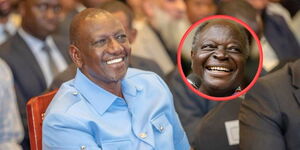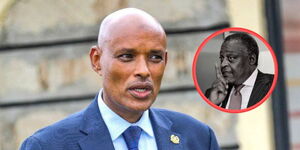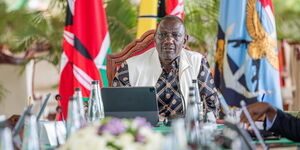A New World Bank report praised President William Ruto's efforts to raise revenue by increasing the tax rates after his inauguration.
The report titled Kenya Economic Update, published on Wednesday, June 7, underscored the government's role in sustaining the economy and lowering the debt to Gross Domestic Product (GDP) ratio, which currently stands at 67.4 per cent.
World Bank, however, warned of three risks that threatened the government's progress in economic recovery; low rainfall, political tensions and monetary policies instituted by the Central Bank.
Heavy rains, instead, would increase agricultural yields and boost the generation of cheap hydro-power. However, it would be detrimental for the government to rely on the seasonal rainfall variability.
Further, climate change is recognised as a major hindrance to the country's growth profile as the government strives to reduce greenhouse gas emissions.
Political tension after the August 9 General Election was highlighted as a regressive factor in the country's stability and growth.
A tighter monetary policy and fiscal consolidation effectively balanced the country's economic environment - from the Central Bank's austerity measures to ensure the constant supply of money in the economy and the realisation of the price objectives set by the government.
To put it into perspective, tighter monetary policies enable domestic assets to become more profitable than foreign assets, resulting in capital inflows. This, in turn, makes imports cheaper and hence eases inflation.
World Bank projected Kenya's inflation rate to decline from 7.6 per cent to 5.7 per cent between 2024 and 2025. The steps taken by the government to reduce the widening debt levels aided in reducing external and domestic imbalances.
“Fiscal consolidation plays a central role in supporting Kenya’s macroeconomic foundations for inclusive and sustained growth," stated World Bank Country Director Keith Hansen.
The lender also projected that the education, hotels and accommodation, and transport sectors would increase in the post-pandemic era and contribute to the GDP, expected to grow by 5 per cent in 2023.
Outgoing Central Bank Governor Patrick Njoroge, on March 30, 2023, predicted Kenya's economy to expand by 5.8 per cent instead of the initial projection of 6.1.
He attributed the disparity to the slower growth in the agricultural sector as the country reeled from the worst drought in four decades, leading to increased prices of basic commodities.
President Ruto defended tax hikes, arguing that the move would create economic stability.
"None of the tax proposals are punitive. We are in charge of the economy. Everybody appreciates that we have stabilised the economy," he stated during an interview with DW News on March 28, 2023.












